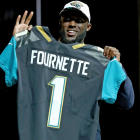The 2011 collective bargaining agreement (CBA) changed the way NFL rookies are compensated. The new system implemented after the lockout was designed to end the practice of unproven commodities being paid near the top of their positional markets.
Salaries at the top of the NFL Draft were drastically reduced. Sam Bradford, the first overall pick of the 2010 draft, signed a six-year contract worth a maximum of $86 million that set an NFL record with $50 million in guaranteed money. A year later, top pick Cam Newton signed a fully guaranteed four-year, $22,025,498 deal, which included a $14,518,544 signing bonus.
Rookie deals are now signed at a much quicker pace. Only 12 of 2016's 253 draft picks were still unsigned when offseason workouts ended in the middle of last June.
The Vikings got the ball rolling by signing sixth-round pick Moritz Boehringer two days after the 2016 draft, which ended April 30. Keanu Neal, the 17th overall pick by the Falcons, was the first player taken in the first round to sign. His deal was completed two days after Boehringer's. The Falcons signed their draft class faster than anybody -- their draft picks were under contract within a week of the draft's completion.
A majority of rookies didn't sign contracts until the latter part of July as training camp approached before the rookie compensation system was overhauled. In 2010, no player selected in the first two rounds had signed by July 4. First-round picks holding out wasn't unusual, either. For example, 2007 first overall pick JaMarcus Russell held out for 47 days before signing with the Raiders. Notwithstanding 2016 third overall pick Joey Bosa, holdouts are largely a thing of the past.
How the rookie wage scale works
The 2011 CBA created a rookie wage scale, which is essentially a salary cap within the overall salary cap. The increases in rookie salaries from one draft class to another are tied to growth of the overall salary cap.
There's a league-wide limit on the total amount of compensation for rookies with specific salary parameters for each draft slot. Teams have maximum and minimum amounts that can be spent on their picks based on draft position.
All contracts for draft choices are four years. Each pick in the draft has a salary floor and ceiling in the first year and over the four years of the contract. There are very few negotiable items with rookie contracts because of the rookie wage scale. The salary components of a deal are restricted to signing bonus, base salary, roster bonus, reporting bonus, workout bonus and select incentives. The type of salary escalators and incentives that were responsible for salaries skyrocketing at the top of draft are prohibited. A majority of picks only have signing bonus and base salaries in their deals.

An extremely important aspect of these deals is the first-year salary cap number (also known as the rookie pool number) because it helps determine the overall value of contracts. The first-year cap number or rookie pool number consists of the player's prorated amount of signing bonus and the rookie minimum base salary, which is $465,000 in 2017.
The maximum annual increase in each of the four years of a deal is 25 percent of the first-year cap number. For example, 2016 fourth overall pick Ezekiel Elliott's cap numbers were limited to a $1,134,379 increase in each year of his deal because his rookie pool number in 2016 was $4,537,516. Since all of these deals have minimum base salaries in the first year, the remainder of the contract is derived within these constraints.
Draft pick contracts can't be renegotiated until the conclusion of a player's third regular season. This means the earliest that Elliott's deal can be redone is late December 2018 or early January 2019.
Teams have an option for a fifth year with first-round picks that must be exercised after the third year of the deal. The period for exercising fifth-year options begins when a player's third regular season ends (Jan. 2, 2017, with 2014 first-round picks). These options must be picked up before May 3. The window just ended for 2014 first-round picks.
The fifth year is guaranteed for injury when the option is exercised. The option year becomes fully guaranteed on the first day of the league year in the fifth contract year (early March 2018 for the 2014 picks).
The fifth-year salary for the top 10 picks is the transition tender, which is the average of the 10 highest salaries for a player's position in the fourth year of his contract. The Texans picked up the option for 2014 first overall pick Jadeveon Clowney. His option-year salary in 2018 is $13.846 million. The fifth-year salary for players selected outside of the top 10 (picks 11-32) is the average of the third- through 25th-highest salaries at a player's position.
Third- through seventh-round picks have a base salary escalator for their fourth year based on participating in a minimum of 35 percent of the offensive or defensive plays, whichever is applicable, in two of the first three seasons of their deals or an average of at least 35 percent playtime in their first three seasons. The salary equals the lowest restricted free-agent tender in the fourth year. The 2017 salary for 2014 third through seventh-round picks that earned the escalator is $1.797 million.
Here's a look at the deals a select group of first-round picks are expected to sign. A discussion highlighting important considerations or issues relating to the first-round contracts follows.
| Pick | Name | Club | 2017 Salary Cap Number | Signing Bonus | Four-year Total |
| 1 | Myles Garrett | Browns | $5,529,501 | $20,258,004 | $30,412,254 |
| 2 | Mitchell Trubisky | Bears | $5,278,625 | $19,254,500 | $29,032,436 |
| 3 | Solomon Thomas | 49ers | $5,118,978 | $18,615,912 | $28,154,382 |
| 4 | Leonard Fournette | Jaguars | $4,936,524 | $17,886,096 | $27,150,882 |
| 5 | Corey Davis | Titans | $4,617,227 | $16,608,908 | $25,394,750 |
| 8 | Christian McCaffrey | Panthers | $3,134,782 | $10,679,128 | $17,241,304 |
| 10 | Patrick Mahomes | Chiefs | $2,986,538 | $10,086,152 | $16,425,962 |
| 12 | DeShaun Watson | Texans | $2,518,997 | $8,215,988 | $13,854,482 |
| 20 | Garett Bolles | Broncos | $2,005,842 | $6,161,928 | $11,032,134 |
| 24 | Gareon Conley | Raiders | $1,903,211 | $5,752,844 | $10,467,662 |
| 30 | TJ Watt | Steelers | $1,683,420 | $4,873,680 | $9,258,810 |
| 32 | Ryan Ramczyk | Saints | $1,616,693 | $4,606,772 | $8,891,810 |
The offset question
The two primary negotiating issues, particularly at the top of the draft, are the payment schedule of the signing bonus and whether salary guarantees will have offsets. The entire contracts of the first 20 picks of the first round were fully guaranteed in 2016.
The Chargers and third overall pick Joey Bosa engaged in the longest contract dispute for an incoming player since the rookie wage scale was implemented. Bosa was the first rookie since 2013 that didn't report to training camp on time. He missed 31 days before signing his contract.
The Chargers and Bosa weren't disagreeing over the amount of money in his contract because the total value was dictated by the rookie wage scale's constraints. The dispute was largely over whether the deal should contain offsets and the payment schedule of his signing bonus.

Large signing bonuses in NFL contracts are typically paid in installments rather than the player receiving the entire amount upon execution of the agreement. This practice has been a way of life in the NFL for quite some time. When Peyton Manning signed a seven-year deal with the Indianapolis Colts in March 2004 making him the NFL's highest-paid player, $18.5 million of his $34.5 million signing bonus wasn't paid until March 2005.
Signing bonuses for top draft picks are usually paid in two to four installments. Payment of the entire signing bonus before the end of a player's rookie season can depend on whether his contract contains offsets. A team generally receives a more favorable signing bonus payment schedule with a significant amount deferred until early in the next calendar year when there aren't any offsets.
Bosa received a better payment schedule than the Chargers typically give to players with big signing bonuses. Approximately $2.5 million of his signing bonus, which was slightly more than $17 million, was deferred until this past March 15. This type of deferment also occurs sometimes in contracts with offsets.
An offset clause allows a team to reduce the guaranteed money owed to a player when he is released by the amount of his new deal with another team. The player receives his salary from the team that released him in addition to the full salary from his new contract with another club when there isn't an offset. This is also known as "double dipping."
Agents have essentially lost the battle on offsets, like Bosa did last year. Teams with early first-round picks in 2013 were insistent that contracts contain offsets after largely conceding the issue the previous year. Nearly every team other than the Jaguars and the Rams, who don't have a first-round pick this year, require offsets with salary guarantees for draft picks. As a compromise, most teams structure deals containing minimum base salaries in the final three years with the remainder of a player's salary coming in annual roster bonuses that are earned on either the third or fifth day of training camp.
Marcus Mariota, the second overall pick in 2015, extracted a concession from the Titans that the team's other recent first-round picks couldn't. His training camp roster bonuses in 2016 through '18, which is where most of the money is in the last three years of his rookie contract, don't have offsets.
Most teams attempt to preserve contractual precedents at almost all costs, which made the concession to Mariota surprising. Complicating matters was that 2015 first overall pick Jameis Winston had already become the first quarterback taken in the top five since the 2011 CBA revamped rookie compensation to have offsets. The concern is making a concession to one player will open the floodgates for other players to expect similar treatment in the future. The Titans held the line on offsets with Jack Conklin, the eighth overall pick last year.
It will be a surprise if Leonard Fournette, this year's fourth overall pick, has offsets because of Jacksonville's conventions. The Jaguars have never required offsets for top-five picks, and the Jaguars have picked in the top five for five straight years. Trying to establish a new team policy with Fournette could trigger a lengthy holdout. Practically speaking, the offset issue will only come into play in the later years of rookie deals if the player is a disappointment. For example, if Fournette is released in 2020 when his salary is slightly more than $4.15 million and he signed a new deal with the Green Bay Packers for that season for $2 million, he would be making $6.15 million collectively from both teams instead of the Jaguars being able to recoup the $2 million from the Packers to cover their guarantee.
The deals for the final 12 picks of the 2016 first round were guaranteed for the first three years. All except the 31st pick, the last pick in the first round because the New England Patriots were stripped of their selection, either had a portion of their fourth-year base salary guaranteed and/or received a lower base salary with a 2019 roster bonus due the third or fifth day of training camp.





















